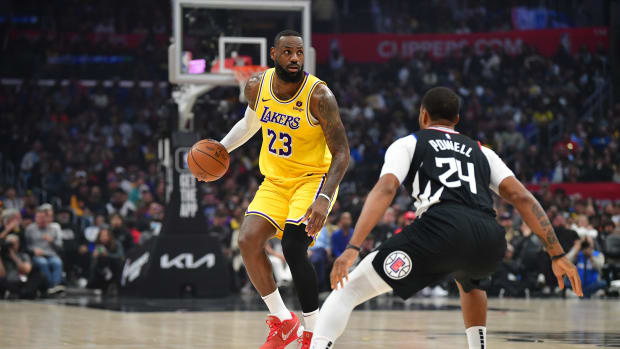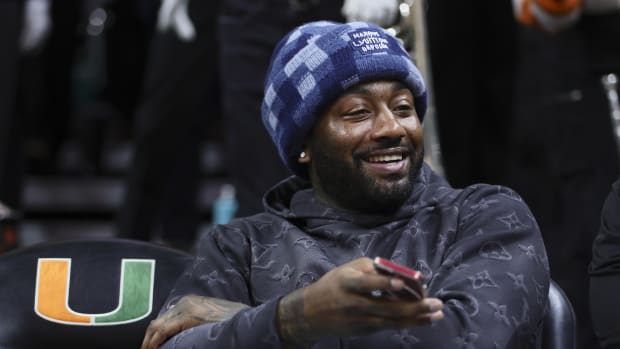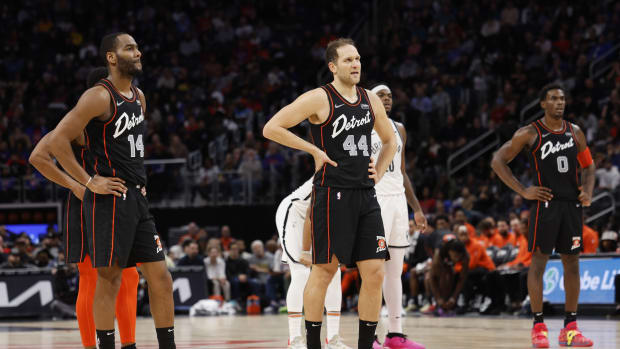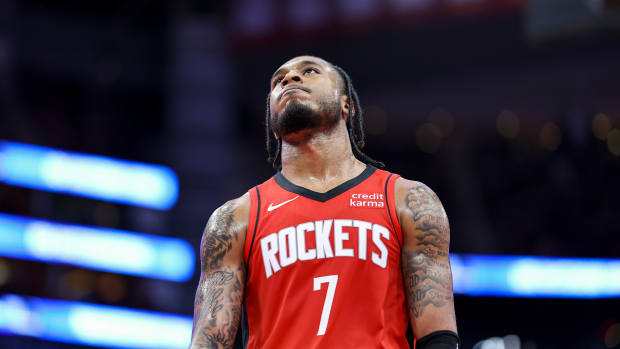Two Years After Durant’s Decision, Adam Silver Changes Tune on Superteam Warriors
LAS VEGAS — Adam Silver’s default setting is cautious. Unlike his predecessor, the NBA commissioner prefers pleasantries, equivocation and deliberate investigations to zingers, ultimatums and snap judgments. With the notable exception of the Donald Sterling saga, which elicited true contempt, there haven’t been many instances in which Silver broke from his meticulous and subdued public demeanor. He rarely uses his pulpit to forcefully campaign for pet issues or sweeping changes.
Two summers ago, though, Silver was blunt in his assessment on Kevin Durant’s decision to join the 73-win Warriors, a move that ran directly counter to his long-stated preference for competitive balance. Perhaps influenced by the anger of rival owners, Silver stated clearly that Superteams aren’t in the NBA’s best interest.
“I’ve read several stories suggesting that that’s something that the league wants, this notion of two Superteams, that it’s a huge television attraction,” Silver said in 2016. “I don’t think it’s good for the league. … When you aggregate a group of great players, they have a better chance of winning than many other teams. … I do not think that's ideal from a league standpoint.”
In the two years since those comments, Golden State has won back-to-back titles, amassed a 32-6 postseason record, led the league in merchandise sales, played dozens of nationally-televised games, swept LeBron James out of Cleveland, and signed center DeMarcus Cousins to add a fifth All-Star to their starting lineup. Meanwhile, a vocal subset of NBA fans and media members has emerged, arguing that the Warriors’ dominance has “ruined” the league by making it virtually impossible for 20+ teams to believe they have a shot at winning the title.
Rather than using the Warriors’ latest free-agency bonanza as an opportunity to campaign for specific changes to the Collective Bargaining Agreement that might break up Superteams, Silver has apparently softened his stance on the defending champions. Addressing reporters from a Summer League press conference on Tuesday, he gave the Warriors the green light to accumulate as many superstars as they can muster.
One Big Question Must Be Answered Before the NBA Can Correct Its Competitive Balance Issue
“We want teams to compete like crazy,” Silver said. “I think the Warriors—within the framework of this deal—should be doing everything they can to increase their dominance. That's what you want to see in a league. You want teams to compete in every way they can within the rules.
“I don't necessarily think it's per se bad that the Warriors are so dominant. As I've said before, we're not trying to create some sort of forced parity. What we really focus on is parity of opportunity.”
Since the initial blast from Durant’s shockwave, Silver seems to have evolved from disapproval to acceptance. There are some good explanations for that shift in tone and language, most notably that the rise of the Warriors didn’t stand in the way of the NBA and the NBPA from successfully negotiating a CBA extension in 2017. On the most basic level, a growing business kept growing.
While Golden State’s immense global popularity is surely a factor as well, there are other recent practical factors at play. LeBron James gave the NBA a much-needed jolt with his decision to join the Lakers, guaranteeing new blood in the 2019 NBA Finals. The Warriors’ success has launched an arms race that now includes the Rockets and Celtics, two fresh and thoughtfully-constructed contenders. And, most practically of all: Silver’s hands are largely tied because it’s extremely difficult to implement drastic rules changes to the CBA so soon after signing the deal. Why go out on a limb advocating for changes if he can’t be sure that the NBPA is on board too?
Regardless, Silver admitted that the owners remain “very focused” on the competitive balance issue and that they engaged in a “very robust discussion” about the topic in Las Vegas this week, adding that some franchises like the Warriors are better positioned to pay steep luxury taxes than others due to “resources in the market and the wealth of the market.” At present, the commissioner said that he didn’t “have anything precise in mind” regarding structural changes to the CBA, other than to continue conversations with the NBPA.
The NBA is Broken, But Not Because of DeMarcus Cousins
For careful readers of the tea leaves, it seems possible that Silver is simply playing the long game, knowing that the league’s current deal runs through at least the 2022-23 season and that its current media rights deal runs through 2024-25.
The most obvious next step in search of greater competitive balance would be to further harden up the cap, building on the increased luxury tax penalties and repeater taxes implemented in the most recent deal. During the NBA Finals back in June, Silver said that the NBA would “continue to look at” an NFL-style hard cap, which would make it virtually impossible to assemble and maintain a Superteam by fixing a ceiling on each team’s spending power. Although Silver stopped short Tuesday of mentioning the hard cap by name again, he did refer to the NBA’s current salary cap set up as “very soft right now.”
“There is work to be done,” Silver said. “I think there is even more we can do to improve the competitive landscape. … But I’m not here to say we have a problem. I love where the league is right now.”
In other words: If the NBA is ruined, it’s news to him. And if the Warriors’ rivals were holding out hope that Silver might play dynasty-breaker, it’s time to go back to the drawing board.



































